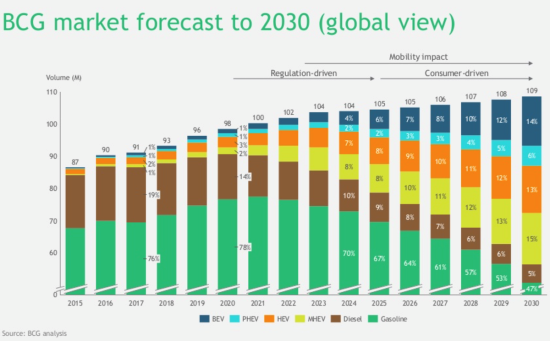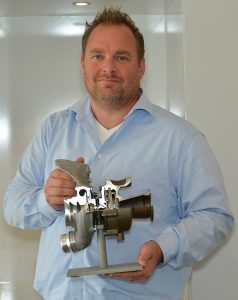The electric car revolution is coming
With 1.2 million electric vehicles (EVs) sold worldwide in 2017 and more than 165 models for sale, a new milestone was reached for the electrification of the car industry. China is leading the sales with a 48% share, followed by Europe, which takes up a 26% share of the market. Approximately 307,000 EV’s were sold in Europe in 2017, which is 100,000 more than the year before[i]. However, different factors are still holding back the market and no one can predict exactly when the breaking point will happen and electric cars take over.
Battery development is crucial
Battery prices have declined faster than anyone had forecast 5-10 years ago. According to Bloomberg, the current price is only one fifth of what it was in 2010. Furthermore, Bloomberg forecasts that the price could drop to below US$100 per Kw/h by 2026. The price reductions are driven by advances in battery development, higher battery density and economies of scale in production. However, scarcity of raw materials such as cobalt could make price reductions stagnate before they reach this point[ii]. Currently all the fuss is about solid-state batteries, and how these could really advance electric driving. The great advantage of solid-state batteries is that they are safer because the flammable liquid electrolytes traditionally used in battery manufacturing are replaced by solid components. Furthermore, they can increase the energy density of the batteries, can be charged faster, and last longer. However, although many parties are developing solid-state batteries, it is not expected that there will be a ready solution for electric cars anytime soon[iii].
Government incentives still have an impact
Until electric cars reach the same price parity as those powered by the internal combustion engine (ICE), government incentives still have a strong influence on sales. While almost all countries in the EU provide a tax benefit of some sort, only a few provide a discount on the purchase price or some other incentive. Germany and Belgium provide a €4,000 purchase grant when buying a battery electric vehicle (BEV), while the UK offers £4,500, and France as much as €10,000. -Norway has had the biggest success in selling EV’s, and in 2017 had a 39.2% market share. Incentives used in Norway have been tax reductions, free parking: no charges on toll roads and ferries, etc. and these have clearly had a positive effect on sales. The current incentives in Germany have also led to a steep increase in EV sales. However, the opposite is also true in countries where the incentives have been pulled back. Denmark and the Netherlands have seen a clear decline in EV sales since certain incentives were removed. EVs clearly still need government support before they can compete with ICEs[iv].

Will turbochargers disappear soon?
Bloomberg forecast that 54% of passenger car sales will be an EV model by 2040[v]. As can be seen in the graph, BCG forecasts that it will develop faster and predict EVs to account for almost 50% of passenger car sales as soon as 2030. However, the term -“EV”- often tends to cover a broad range of vehicle types from plug-in hybrid to fully electric. When looking closer, BCG actually forecasts that around 14% of sales will be fully electric cars, while 15% will be mild hybrid, 13% hybrid and 6% plug-in vehicles. While turbochargers do not have any foreseeable future in fully electric cars, they are still very much relevant in all types of hybrid cars, where an internal combustion engine is still present. Therefore, turbochargers will still be around for quite a while[vi].
However, at MTEE we want to be ready for a future where electric vehicles are leading the market. We are already developing different technologies where we can combine our strong knowledge of turbochargers and power trains with electric solutions. One example is the e-boosting technologies for 48V mild hybrids. The market for 48V mild hybrids is forecast to expand tremendously in the coming years, delivering an excellent solution to adhere to the European emission standards for 2020. MTEE is currently developing electric boosting technologies applications to assist the turbocharger in this type of vehicle, while also looking into technologies for other types of EV’s.
MTEE is also developing a gas turbine range extender for fully electric vehicles (BEV). A range extender is an application which can charge the battery of a BEV while driving. This reduces range anxiety and also allows for the use of a smaller battery in the car. This solution could make BEVs more affordable and attractive while reducing the environmental footprint.
The breakthrough of the electric car revolution is still some decades away. However, our company is busy transforming itself from specializing in improving the performance of fuel driven vehicles to also becoming a future leading supplier in technologies for electrically driven cars.



